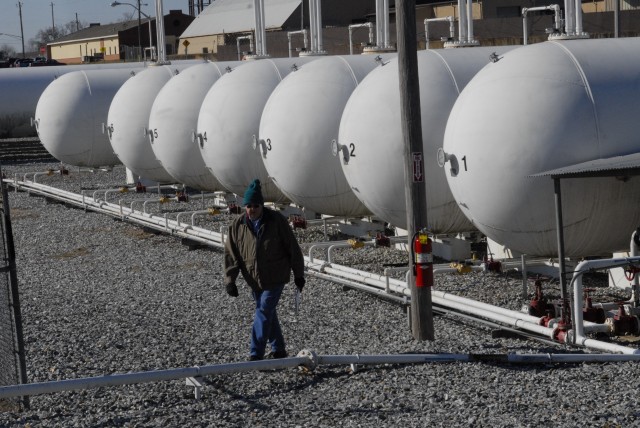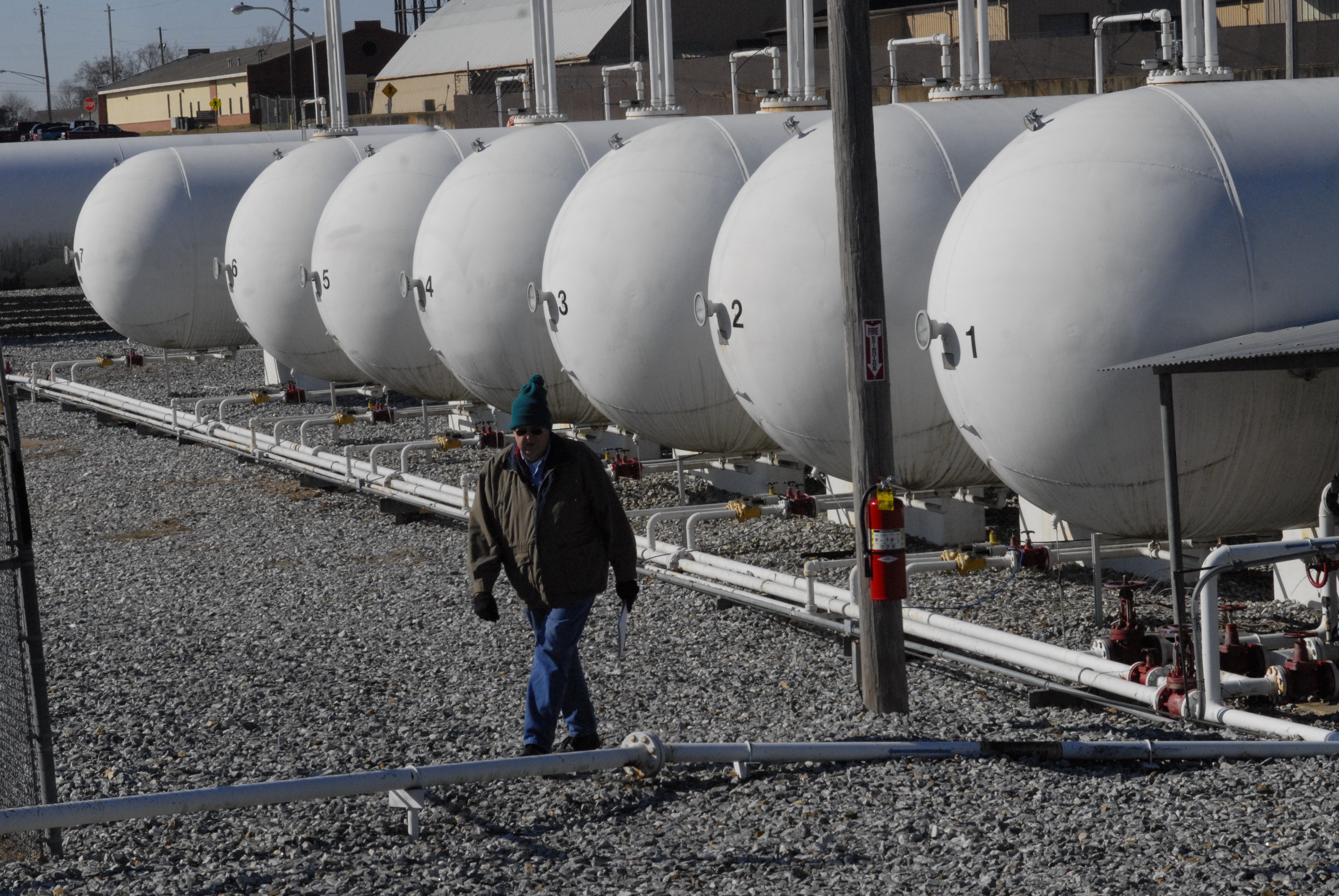FORT BENNING, Ga. - During Arctic blasts each winter, Fort Benning turns to a solution that cuts down on natural gas use and generates millions of dollars in annual energy savings.
As temperatures plunged into the teens earlier this week, the Directorate of Public Works got the call from Atmos Energy, its natural gas supplier, to crank up the peak shaving plant Sunday morning on Main Post, officials said. The facility, which moderates the flow of natural gas while maintaining heat levels in buildings across the installation, is activated only a few times each year but might remain on through the weekend - with the tricommunity gripped by the longest sustained cold snap in more than a quarter-century.
Vernon Duck, DPW's energy manager, said "peak shaving" is done in the energy sector to limit use and lower demand on a commodity.
"There are peaks and valleys in consumption during a day. So what we do, when you have a peak in your demand, you cut that peak off," he said. "Since we can't really do any shedding of the load here, we actually cut off our natural gas demand by injecting the propane-air mixture into the lines that serve the installation. We're reducing demand on natural gas. That's what the process of 'peak shaving' is all about."
If not for the plant, Fort Benning's winter energy costs would be dramatically higher, he said.
"Very rarely do people even know we have the plant online because it doesn't impact their heat or hot water situations at all," he said. "Because we have that plant and have that ability to curtail our natural gas consumption, we are able to negotiate a real good utility rate from Atmos Energy. And that rate saves us well over $1 million a year whether we run the plant or not.
"The plant ensures quality of life for our Soldiers and everybody who works here, and I don't know you can put a dollar amount on that."
Duck said the peak shaving plant has 25 tanks that hold 30,000 gallons of propane each, along with mixers, a vaporizer and boiler. Complex engineering calculations are used to reach a blend capable of burning in natural gas equipment at the same reading and rate.
Since the startup, four employees are working around the clock in 12-hour shifts, said Danny Leonard, utilities branch chief for Shaw, the contractor that operates the plant.
"It's more than one person can handle," Leonard said. "But the propane plant is no more dangerous than natural gas."
Between Sunday and Tuesday, the plant used about 100,000 gallons of propane and engineers believed they would surpass 250,000 by week's end, said Mickey Livingston, a Shaw electronics technician.
Duck said the facility can run up to 18 days without any natural gas. Atmos issues all natural gas curtailment orders and decides whether to turn on the peak shaving plant; in return, it charges DPW a lower rate for natural gas.
"Last year, we curtailed three times, but once was for only a half-day," he said. "It just depends on the gas line and what we get from Atmos. Normally, it'll run for a day or two at max. Right now, with the weather forecasts, we might run it the entire week and possibly into Monday."
Even if conditions are mild locally, Fort Benning can still be asked to trigger the peak shaving plant, particularly when Atmos anticipates natural gas shortages nationwide due to cold weather in the Midwest or along the East Coast, officials said.
Built in 1958, the plant has been upgraded and expanded over the decades to accommodate Fort Benning's growth. DPW will spend about $1.8 million on another overhaul this year with federal funds received from the Troubled Asset Relief Program.
Duck said work will start in March and should be completed before the start of curtailment season, which runs from November to February each year. New digital, computerized system controls are being installed to allow for remote-starting capability, while the plant will exceed national safety codes.
"Right now, we comply with the National Fire Protection Association safety standards," he said. "What we're doing is modernizing the entire system."
DIGGING DEEPER:
What is a peak shaving plant'
Fort Benning's peak shaving plant mixes air with propane and injects it into the natural gas lines across the installation, where it's burned in boilers, stoves and water heaters. Normally, the plant only operates when natural gas pipelines are at full capacity during the winter, usually when temperatures dip below freezing.
"This operation keeps the pipeline able to flow the maximum quantities of natural gas, and in return, we get a cheaper natural gas rate year-round," said Mark Fincher, chief of DPW's business operations and integration division. "We save in the neighborhood of a million dollars a year on gas costs just by having the capability to 'peak shave' the natural gas requirement at this installation."
HUGE ENERGY SAVINGS:
The post has a "hold-firm contract" with Atmos Energy, its natural gas supplier, and faces stiff penalties for exceeding a daily use total of 27,000 cubic feet. If that amount is topped, DPW must pay $25 per additional 100 cubic feet.
Costs fluctuate due to market changes, but based on October prices - the latest figures available - the normal daily rate on natural gas was $7.27 for every 1,000 cubic feet (MCF).
On Monday, the peak shaving plant consumed 55,228 gallons of propane, which is equal to 5,059 MCF, at a cost of about $80,000. It also used 2,100 MCF of natural gas. Without the plant running, Fort Benning would have paid $1,114,221.20 in penalties alone for that day.


Social Sharing